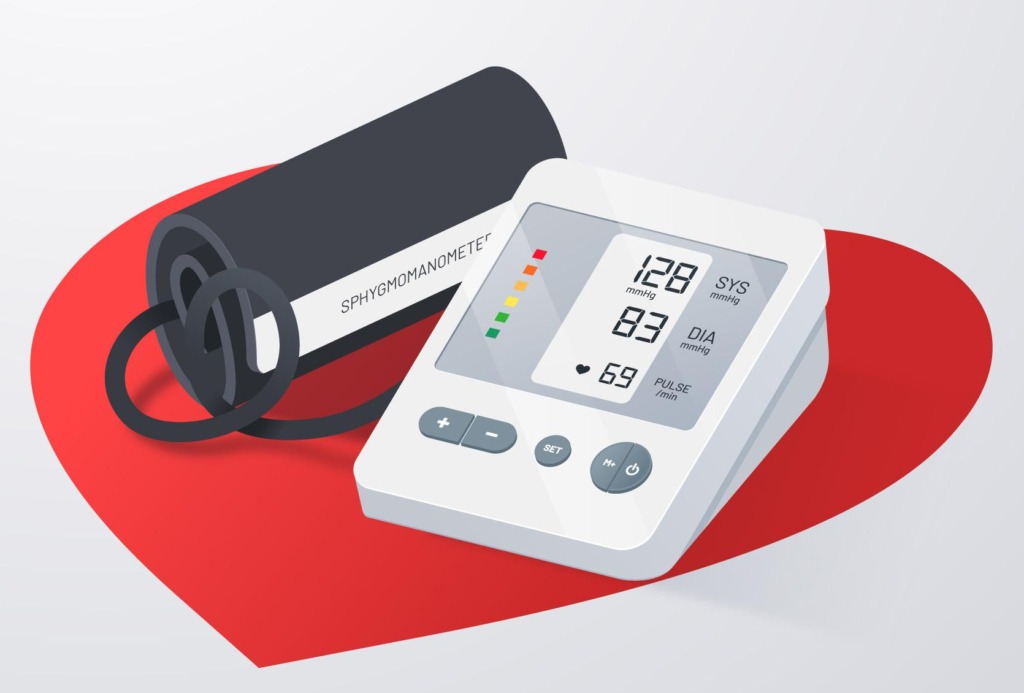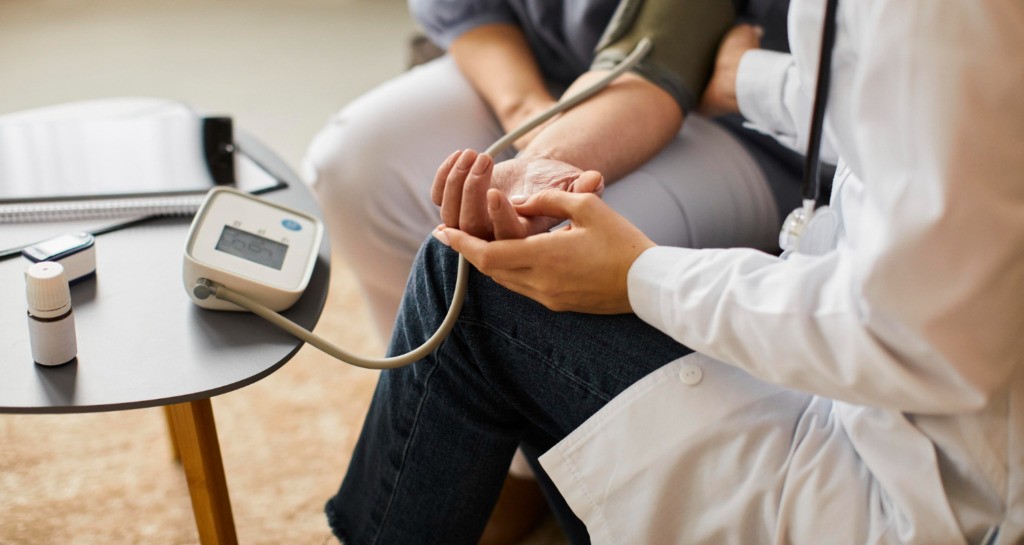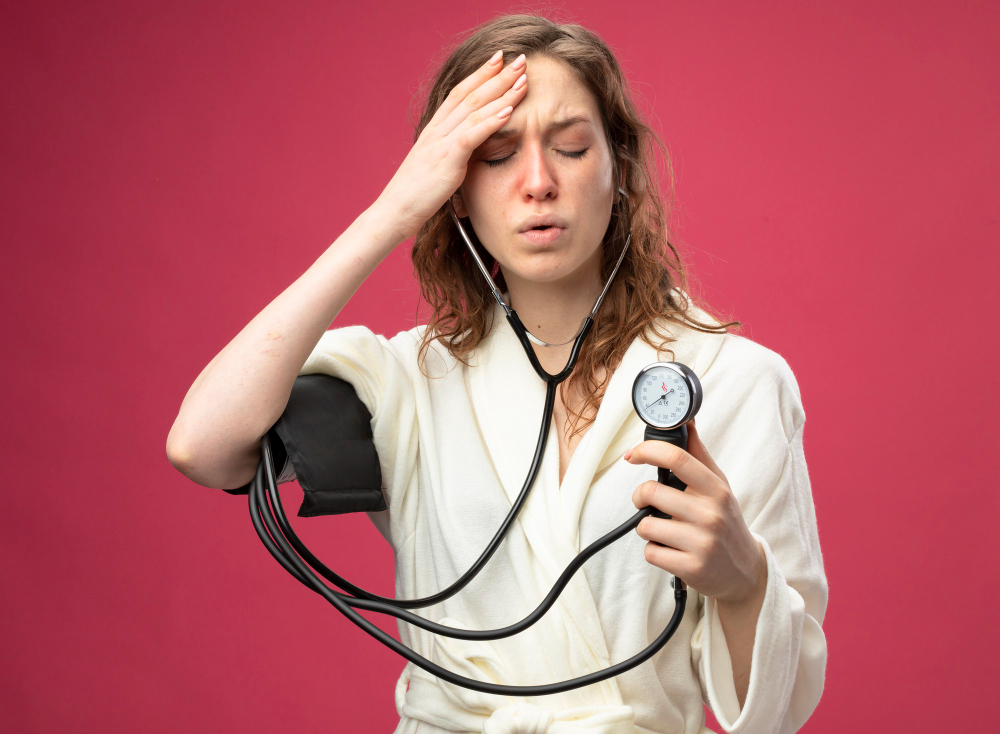Hypertension, another name for high blood pressure, is a common but potentially fatal illness. It is a major contributor to heart disease, stroke, and other major health issues, affecting millions of people globally. Despite being common, hypertension is frequently misdiagnosed or disregarded because, particularly in its early stages, it may not have any outwardly apparent symptoms. The purpose of this post is to provide more information about the warning signs and some high blood pressure symptoms, including their causes, what to do if you see them, and how to handle them.

Understanding High Blood Pressure
Knowing what high blood pressure is and how it affects the body is crucial to understanding its symptoms. The power your blood applies to your artery walls as your heart pumps it throughout your body is measured by your blood pressure. Two numbers are used to express it:
Systolic Pressure: The top number on your blood pressure reading shows the systolic pressure, which is the pressure in your vessels when your heart beats.
Diastolic Pressure: The number at the bottom of the screen represents the pressure in your arteries during the period in which your heart is at rest between pulses.
Generally speaking, a blood pressure level of 120/80 mm Hg is considered normal. Hypertension is defined as blood pressure that continuously rises to 130/80 mm Hg or above. An excessive amount of stress is placed on your cardiovascular system by persistently high blood pressure, which increases the risk of atherosclerosis, heart disease, kidney damage, and other problems.

Why Hypertension is Called the “Silent Killer”
The reason hypertension is sometimes referred to as the “silent killer” is that it can harm your body covertly for years before symptoms appear. As the disease develops, many persons with high blood pressure show no symptoms at all. The absence of symptoms may induce a false sense of security in people, postponing diagnosis and treatment.
When symptoms do arise, though, they frequently indicate that blood pressure has risen to dangerously high levels, necessitating prompt medical attention. It’s critical to identify these signs in order to stop long-term health damage.
High Blood Pressure Symptoms
Even though high blood pressure doesn’t always cause symptoms, there are times when it does and especially when it is dangerously high. If you recognize these signs, you may be able to get help before things get worse.
- Headaches
An ongoing headache is one of the most typical signs of high blood pressure, particularly if it happens first thing in the morning. These headaches might be mild and pulsating or intense and incapacitating. Your body may be unable to control the increased power of the blood due to the pressure in your blood vessels, especially those in the brain, which could be the source of severe headaches.
- Lightheadedness or dizziness
Experiencing lightheadedness or dizziness may indicate hypertension, particularly when these symptoms strike suddenly. This symptom could be the consequence of stiffened or constricted arteries limiting blood flow to the brain. In extreme situations, it could be a sign of a medical emergency known as a hypertensive crisis.
- Breathing difficulties
Breathlessness is an additional symptom that may be linked to hypertension. Breathing difficulties might arise from your heart being less efficient as it works harder to pump blood through constricted or stiffened arteries, especially during physical exercise. This symptom may also be associated with heart failure, which is frequently brought on by persistent hypertension.
- Chest Aches
Angina, or chest pain, is a dangerous sign that can mean your heart is having trouble pumping blood because of high blood pressure. This pain might radiate to the shoulders, arms, neck, jaw, or back and feel like pressure, tightness, or squeezing in the chest. Never disregard chest pain since it may indicate a major cardiac problem or an imminent heart attack.
- Hazy Or Blurred Vision
High blood pressure can cause hypertensive retinopathy, a disorder that damages the blood vessels in your eyes. In severe situations, this disorder may result in sudden visual loss, double vision, or clouded vision. Frequent ocular examinations can aid in the early detection of this illness, particularly in those with established hypertension.
- Exhaustion
Feelings of persistent weariness or unexplained fatigue may indicate that your heart is working too hard because of elevated blood pressure. Persistent fatigue may result from your body not getting the oxygen and nourishment it needs as a result of your heart’s inability to pump blood efficiently. Although fatigue is a general symptom that can be linked to a variety of illnesses, it should not be disregarded in the context of hypertension.
- Bleeding noses
Although rarer, frequent or severe nosebleeds may indicate hypertension. Because of the increased pressure, the sensitive blood vessels in the nose may burst, resulting in nosebleeds. It could be worth testing your blood pressure if you frequently get nosebleeds that don’t seem to have an obvious reason.
- An irregular heartbeat
When the heart’s electrical system is impacted by excessive blood pressure, palpitations—an irregular or fast heartbeat—may result. Your heart may seem to be flickering, skipping beats, or throbbing excessively strongly. Although there are many causes of palpitations, episodes that are severe or prolonged should be evaluated by a doctor since they may point to underlying cardiac problems.

Why These Symptoms Occur
The additional load on your cardiovascular system results in high blood pressure symptoms. Blood flow to essential organs can be lowered over time by arteries narrowing or stiffening due to the constant strain of high blood pressure. Fatigue, headaches, and dizziness are some of the symptoms that might result from oxygen deprivation in the tissues brought on by this decreased blood flow. Shortness of breath, palpitations, and chest pain are some of symptoms that can arise when the heart is impacted.
Furthermore, the harm that hypertension does to blood vessels might impact particular organs, resulting in symptoms like nosebleeds (produced by weak blood vessels in the nose) or blurred vision (induced by damage to the eyes).

When To Consult A Physician
It’s crucial to see a doctor if you encounter any of the symptoms listed above, particularly if they are severe, ongoing, or getting worse. It’s important to get your blood pressure checked frequently even if you don’t have any symptoms, especially if you have risk factors like obesity, a sedentary lifestyle, or a family history of hypertension.
High blood pressure makes you more likely to get heart disease, stroke, and kidney failure, all of which can be fatal. The likelihood of these problems can be decreased by treating hypertension early on. In addition to taking blood pressure medication, treatment options may include dietary modifications, increased physical activity, stress reduction, and improved sleep.
In Summary
Blood pressure is a quiet but dangerous danger to your well-being. It frequently doesn’t show any signs, but over time, it has the potential to seriously harm your health. You can take proactive measures to safeguard your health by being aware of the subtle indicators of hypertension and scheduling routine check-ups with your doctor. Recall that controlling your blood pressure with dietary adjustments and, if required, medicines can greatly lower your chance of developing life-threatening conditions. For an assessment and course of treatment, see a healthcare professional right away if you think you might have high blood pressure or if you are exhibiting any associated symptoms.



